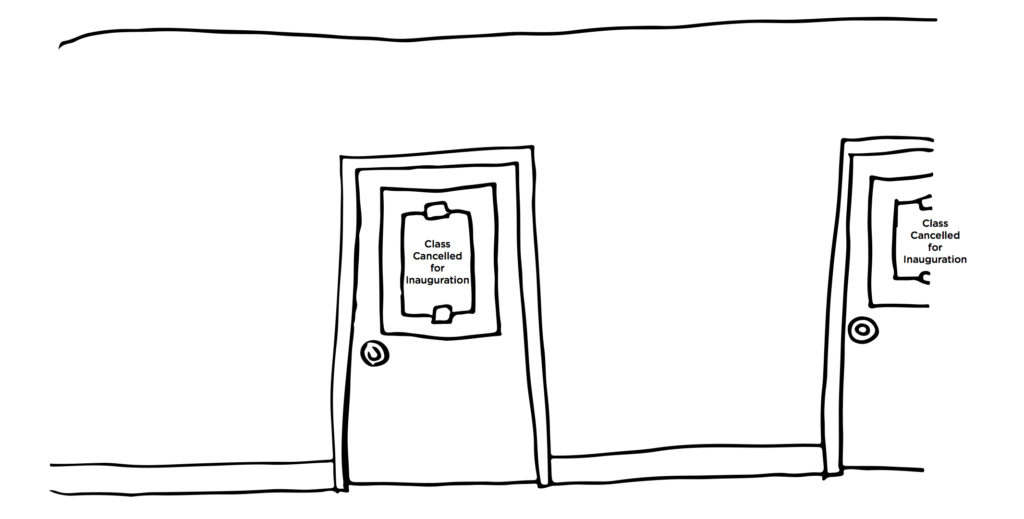The election of Donald Trump has challenged and affected many members of our campus community. With the inauguration occurring on the morning of Friday, Jan. 20, students and faculty alike are rallying around a sense of unity and solidarity as a rebuttal to the increasingly polarized nature of modern politics during wthis divisive time.
Student Government at Seattle University (SGSU) has decided to create a place of civic interaction with the help of staff members by establishing a wall of words in the Student Center. A wall of words allows for participants to engage in discussion with each other in a pseudo-anonymous manner by placing messages on a wall in the fashion of a bulletin board.
“We had a number of students that would come into the office and ask; ‘what are you doing about the inauguration? How are we responding? Is there a space we can engage with?’” said Braden Wild, SGSU Vice President of University Affairs.
When completed, the wall will display the diverse perspectives of the Seattle U community in a solemn discourse as President-elect Trump moves into the White House.
“It’s critical that students engage civically and express their opinion, whatever that opinion is,” Wild said. The wall can be found near the SGSU offices on the third floor of the Student Center.
The project was organized by faculty members like English Professor Susan Meyers, who was deeply affected by her students’ responses to the election. She was critical in orchestrating walls of words in the Casey building and the Xavier Residence Hall after Trump’s election night win.
“I looked to the subway project that was happening in New York that involves someone sponsoring it and leaving materials in the shapes of post-it notes and pens with a description of how to engage in a dialogue, and people go from there,” she said.
The ultimate goal of the wall is to be a platform of discussion that allows the diverse perspectives on campus to engage with and listen to one another.
“This is really a time I believe that people need to come together, and I’m wanting to see us do that, do it visually, do it in terms of communication, in terms of events, in terms of the campus and the rest of the city, wanting to see us do it between states and nationhood,” Meyers said.
Various Seattle U student groups are planning events in which they engage with the community on inauguration day. Socialist Students, a national political group, is planning on spending inauguration day rallying at Seattle Central Community College and protesting for immigrants’ rights.
Some professors are instead using their educational authority to advance the conversation. Among them is English Professor Molly Clark Hillard, who is helping to combat fake news by partnering up with the campus library. Hillard’s course, “Crisis of Information,” focuses on information literacy and being able to recognize what constitutes fake news. Hillard’s commitment is to tying her position as an educator to the lives and feelings of her students.
“The day after the election, I had to teach ‘Jane Eyre,” she said. “We turned to ‘Jane Eyre’ and found it as a manifesto. My own practice is to say to my students this is how we move forward; literature is how we move forward.”
The resounding thread tying these groups and people together has been the persistent call for unity as a way of combating the toxic divisiveness that has pervaded this election cycle.
That ranks highly among the more troubling phenomena of the election for history professor Fr. Thomas Murphy, who called it an incredibly sad spectacle to watch.
“The electorate is gradually becoming more and more polarized, and it seems people have fewer and fewer opportunities to talk with people who disagree with them,” Murphy said. “Oftentimes when students are opposed with someone’s statement, instead of responding directly to the statement, they’ll make an ad hominem, which is exactly what they see the politicians doing.”
These words especially ring true for the small—or silent—minority of students who lean toward conservatism at Seattle U.
“I did not vote for Donald Trump. I did not support his actions. I’m a registered Republican back home; I think I’m trying to find my little spot in the puzzle,” said freshman marketing and Spanish major Justin Koochof. “I think there’s a built-up stigma against Republicans and people of a conservative mindset, that you’re sort of a backwards anti-progressive thing. You’re starting off in this hole where you can’t really get out.”
For individuals on all points of the political spectrum, the future is uncertain. It can be tempting for one to safely ignore the views of others, but a conversation always has more than one side. As the inauguration draws closer, it serves any community well to remember that.
The editor may be reached at
news@su-spectator.com









Arthur Fisher
Jan 20, 2017 at 12:45 pm
Susan Meyers was my student; I greatly admire her; but this project is children playing in a sandbox. It gives them a false feeling of relevance and participation until some employer can teach them how to be useful. What quality of thought can be written on a post-it note? Epithets, expressions of woe, and charges, yes: apparently the new mode of discourse at Seattle University. I was hardly a supporter of Barak Obama, but I did try to understand his positions and his appeal. I listened to people. I read his books. You might try a similar exercise now.